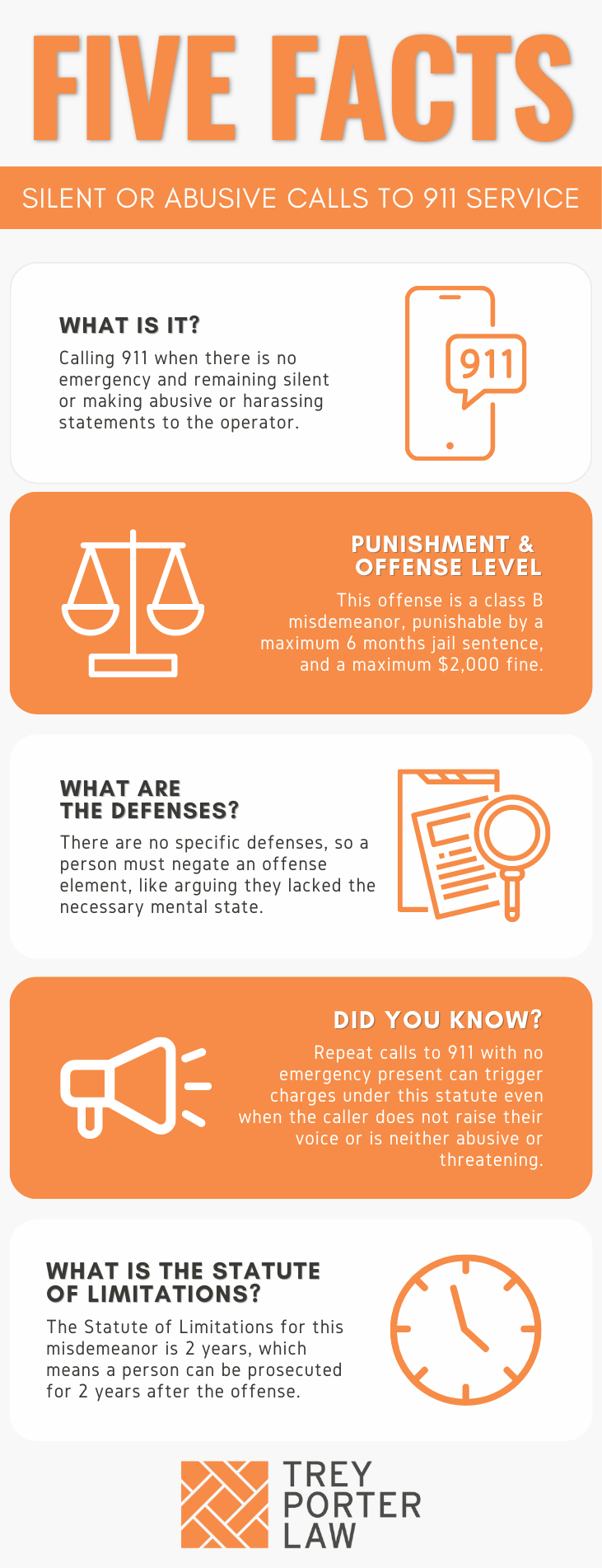WHAT IS SILENT OR ABUSIVE CALLS TO 9-1-1 SERVICE IN TEXAS?
The Texas law against silent or abusive calls to 9-1-1 service prohibits calling 9-1-1 when there is no emergency, staying silent prior to hanging up, or making abusive or harassing statements to dispatch.

WHAT IS THE SILENT OR ABUSIVE CALLS TO 9-1-1 SERVICE LAW IN TEXAS?
Tex. Penal Code § 42.061. SILENT OR ABUSIVE CALLS TO 9-1-1 SERVICE.
(b) A person commits an offense if the person makes a call to a 9-1-1 service, or requests 9-1-1 service using an electronic communications device, when there is not an emergency and knowingly or intentionally:
(1) remains silent; or
(2) makes abusive or harassing statements to a PSAP employee.
(c) A person commits an offense if the person knowingly permits an electronic communications device, including a telephone, under the person’s control to be used by another person in a manner described in Subsection (b).
(d) An offense under this section is a Class B misdemeanor.
WHAT IS THE PENALTY CLASS FOR SILENT OR ABUSIVE CALLS TO 9-1-1 SERVICE IN TEXAS?
Silent or abusive calls to a 9-1-1 service is a Class B misdemeanor, punishable by up to 180 days in county jail.
WHAT IS THE PUNISHMENT RANGE FOR SILENT OR ABUSIVE CALLS TO 9-1-1 SERVICE IN TEXAS?
The punishment range for silent or abusive calls to a 9-1-1 service, a Class B misdemeanor, is up to 180 days in jail, and a maximum fine of $2,000.
WHAT ARE THE PENALTIES FOR SILENT OR ABUSIVE CALLS TO 9-1-1 SERVICE IN TEXAS?
A person charged with making silent or abusive calls to a 9-1-1 service may be eligible for probation after a conviction, or deferred adjudication without a conviction, for a maximum period of two years.
WHAT ARE THE DEFENSES TO SILENT OR ABUSIVE CALLS TO 9-1-1 SERVICE IN TEXAS?
A person accused of silent or abusive 9-1-1 calls may defend against the charge by asserting a lack of intent.
- Are accidental 9-1-1 calls a crime? For a person to be convicted of silent or abusive calls to 9-1-1, the State must show he or she intentionally or knowingly remained silent or made “abusive or harassing statements” to dispatch. If a person did not intend to request emergency services in a non-emergency, and knowingly hangs up immediately or apologizes, they did not intentionally or knowingly commit the offense. In practice, law enforcement only arrests a caller if several non-emergency calls are made.For example, in Atkins v. State, the defendant was charged with silent or abusive 9-1-1 calls after making five hang-up 9-1-1 calls in one night, and two more the following night. Officers responded both nights, and arrested the defendant after the seventh call in two days. He claimed he “butt-dialed” those calls, but was ultimately convicted. The State showed at trial the defendant made 64 calls to 9-1-1 in the months surrounding the two nights in question, which tended to show his calls were not an accident.
WHAT IS THE STATUTE OF LIMITATIONS FOR SILENT OR ABUSIVE CALLS TO 9-1-1 SERVICE IN TEXAS?
The limitation period for silent or abusive calls to a 9-1-1 service, a Class B misdemeanor, is two years.
SILENT OR ABUSIVE CALLS TO 9-1-1 SERVICE IN TEXAS
The public has an interest in keeping 9-1-1 service communication lines clear for true reports of crimes and emergencies. In furtherance of this safety interest, Texas law punishes making harassing, repeated, or silent calls when there is no emergency requiring a response.
TEXAS SILENT OR ABUSIVE CALLS TO 9-1-1 SERVICE COURT CASES
The case law regarding silent or abusive call to 9-1-1 service in Texas explains the low threshold required to show calls are “abusive” or “harassing.”
- In Clark v. State, defendant was convicted of silent or abusive calls for making seven non-emergency calls to 9-1-1. She argued her calls were not “abusive” or “harassing” because she did not threaten anyone, raise her voice, or use profanity. The appellate court affirmed her conviction—“harassing” includes persistently disturbing, bothering, or pestering another person, regardless of whether one’s voice is raised or menacing. The defendant repeatedly called 911 despite being told her concerns were not an emergency.












